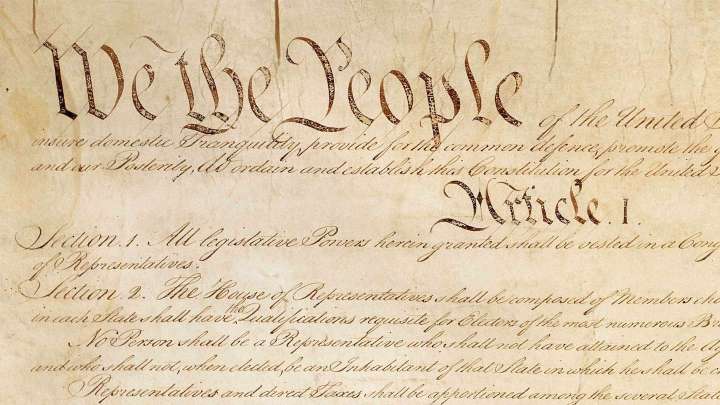Bernice B. Donald is a judge on the U.S Court of Appeals for the 6th Circuit. Don R. Willett is a judge on the U.S. Court of Appeals for the 5th Circuit.
How to counter today’s tribalism and build ‘a more perfect union’

After all, one is an African American female Obama appointee, the other a White male Trump appointee.
For starters, we’re friends. More, we respect each other as judicial siblings committed to a shared oath; our robes are black, not red or blue. In this coarse and graceless age, believing that our similarities eclipse our differences might be derided as Pollyannish. So be it.
Saturday is Constitution Day. But let’s begin with the Declaration of Independence, which in 2026 will mark its semiquincentennial — 250 years.
The Declaration is aspirational, debuting a uniquely American theory: that government exists to secure people’s inborn, individual, inalienable rights. The Constitution is architectural, erecting a structure to achieve those ideals. But the union was very far from perfect at the founding: One-third of the Declaration’s signers were enslavers.
Still, the Rev. Martin Luther King Jr. was right in 1963 when he called the nation’s founding documents “a promissory note to which every American was to fall heir.” While he recognized that America had “defaulted” on that note in failing to recognize equality for African Americans, he also knew that those founding documents made possible a government that could correct itself over time. He was echoing Frederick Douglass, who a century earlier declared that the Declaration’s promises of liberty and equality are eternal, even if America betrayed those promises.
King implored Americans not to tear down the nation’s heritage but to live up to it. Doing so might seem difficult these days, when entrenched tribalism threatens to swamp citizens’ shared attachment to the nation. But that makes trying all the more important. This Constitution Day, here are five suggestions to help form a “more perfect union.”
Log off. In today’s hot-take culture stoked by social media, the art of disagreeing agreeably seems quaint. The snarling, sneering and sniping are on full display in a realm we know well: modern law schools. Online incivility seems to fuel real-life boorishness. Earlier this year, a panel at Yale Law School brought together lawyers from the left and right to tout the importance of free speech. Chaos ensued. That is what happens when views held by the “other side” are deemed no longer debatable but disreputable. Better to reject venomous online voices — and promote civility in the physical world.
Learn up. The civics IQ of “We the People” is not exactly Mensa-level. According to the 2022 Annenberg Civics Survey, most American adults cannot name all three branches of government, and 25 percent cannot name a single one. The judicial branch is likely the least understood — especially by those who depict the judiciary as hijacked by craven politics. Facts are hostile witnesses. The Supreme Court’s rate of dissent today is no higher than it was in 1945, when eight of nine justices had been appointed by the same president. Besides, fixating on the Supreme Court is distorting: Ninety-nine percent of federal cases go no higher than regional circuit courts. That’s where we serve, and we can attest, as research has shown, that roughly 98 percent of circuit-court decisions are unanimous — hardly a sign of ideologically driven judging.
Reach out. Genuine across-the-aisle friendships are rare today. According to an NBC News-Generation Lab poll last month, about half of college sophomores say they wouldn’t date, or even choose as a roommate, someone who didn’t vote as they did in the 2020 presidential election. Americans too often hunker down in like-minded echo chambers, marinating in confirmation bias, rarely encountering, much less befriending, anyone who sees the world differently. Cross-party friendships are no easy feat. But if Justices Antonin Scalia and Ruth Bader Ginsburg could do it, so can we — and so can you.
Pull back. Many Americans view everything through a political prism. Entire identities get distilled to partisan labels. The places where attachments were found — such as civic and religious institutions — have thinned out, and politics has rushed into the vacuum. Political strife is nothing new, but things have radically intensified. Regrettably, some judges contribute to the noxiousness, penning acidic opinions that fuel a perception of judges as ideological combatants rather than evenhanded arbiters. But the toxicity is culture-wide. Fact: There is more to life than politics.
Plug in. President Jimmy Carter put it powerfully during his 1981 farewell address when he said he would be taking up “the only title in our democracy superior to that of president, the title of citizen.” American citizenship is not a spectator sport. Be engaged citizens, not enfeebled (or enraged) bystanders. Self-government is not self-perpetuating. This raucous republic belongs to us all, and the secret sauce is a sleeves-rolled-up citizenry.
This Constitution Day, if any identity should define us as Americans, let it be one that transcends ideological and demographic differences: Our common identity as heirs to a rich civic inheritance.






